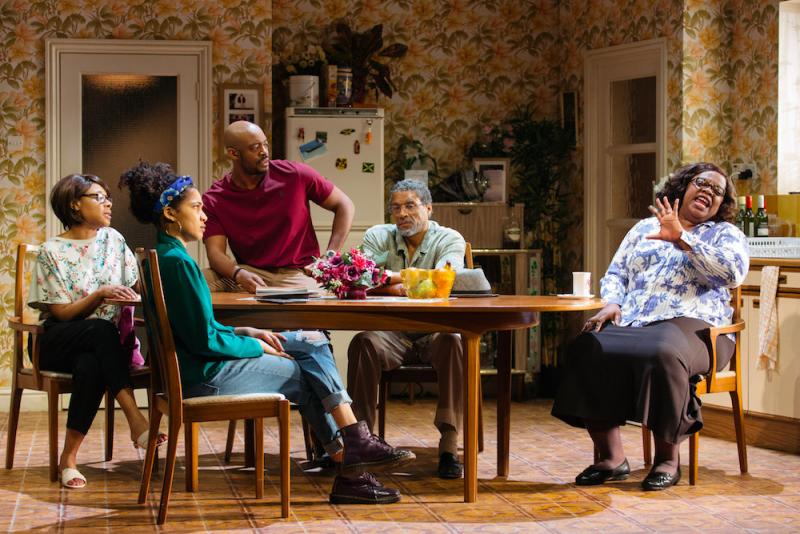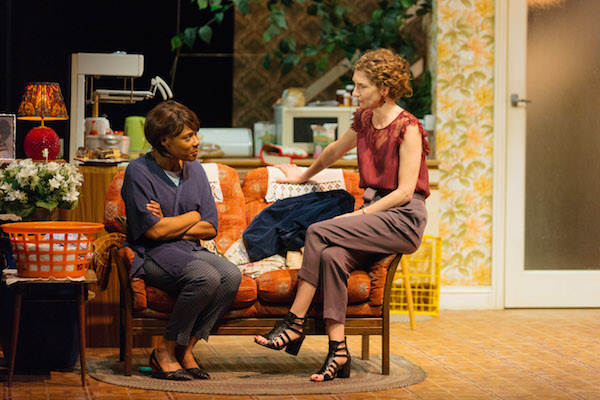Nine Night, National Theatre review - Jamaican family drama full of spirit | reviews, news & interviews
Nine Night, National Theatre review - Jamaican family drama full of spirit
Nine Night, National Theatre review - Jamaican family drama full of spirit
New comedy about a West Indian wake is lively, but a bit undercooked

The good news about so-called black drama on British stages is that it has broken out of its gangland violence ghetto and now talks about a whole variety of other subjects. Like loss. Like death. Like mourning.
Set in the London home of Gloria, who is dying of cancer, this rather traditional family reunion play looks at how each of her children – Trudy, Lorraine and Robert – react to her passing. For the sake of realism, the family situation is quite complicated: Trudy was bought up in Jamaica, where Gloria came from in the 1950s, while Lorraine and Robert were born in Britain. Lorraine has been looking after her mother for the past three months, helped by her 20-something daughter Anita. Robert is married to the white teacher Sophie, and Gloria’s cousins, 70-somethings Maggie and Vince, also arrive.
This is a play that is full of spirit, and spirits
After Gloria’s death, her body remains unburied as the family take part in the traditional Jamaican "Nine Night" wake, which involves lots of food, music, dancing, religious hymns, improvised poems and lots and lots of stories. Naturally, the family conflicts soon begin to bubble over. Robert is a businessman whose plans have gone awry, so he wants his sister Lorraine to sell their mother’s house immediately to raise some cash. But Lorraine has other ideas: she points out that the house is not a property, but a home – and that their mother’s spirit has not yet been released. Meanwhile, there’s a secret pregnancy in the family which threatens to disrupt things even more.
This is a play that is full of spirit, and spirits. Both alcoholic, and of the dead. Gordon uses lashings and lashings of old-world beliefs as well as Jamaican verbal acrobatics, her comic one-liners creating moments of complete hilarity, supplemented by sage sayings: “Be careful, not carefree”; “When yuh get to Heaven, yuh see, God will deal wid yuh”; “Save yuh eye water, niecey”. The linguistic mix of England and the West Indian verbal rhythms gives the dialogues a high energy, and Gordon balances humour and seriousness. She is very good at showing the diversity of grief and loss. And there is plenty of fun amid the tears, and some lovely exchanges.
The faults of Nine Night are the faults of the first-time playwright. Gordon has crammed in too much detail, with the result that despite a powerful ending, with spirit possession and talking in tongues, there are too many loose ends to make for a fully satisfying story. Some scenes are unnecessary, and there’s a lack of focus in the narrative. Conflicts remain unresolved, and the running time of 110 minutes is too short for the material. Still, there are many delightful sequences: Robert’s puzzlement when he volunteers to prepare chicken wings; a story about putting Vaseline on a dead woman’s feet to ease on her stockings before burial; Maggie’s speech in praise of her Freedom Pass.
Director Roy Alexander Weise’s production, designed by Rajha Shakiry, doesn’t quite achieve the required blend of music and dialogues, with one dance sequence performed in semi-darkness, but his cast do him proud. Cecilia Noble’s Aunt Maggie is a thoroughly memorable creation, bursting with humorous life and dominating any scene she finds herself in. Franc Ashman as Lorraine and Hattie Ladbury as Sophie (pictured above), as well as Oliver Alvin-Wilson’s Robert, provide good emotional grounding, and are well supported by Rebekah Murrell’s Anita. Ricky Fearon’s Uncle Vince gets his poetic Shakespearean moment and dispenses lots of wisdom, while Michelle Greenidge’s Trudy is sublimely lively.
Our current affection for the Windrush Generation makes this play timely, and many of the lines suddenly sound more relevant than ever. When Trudy says, “Everyting for oonuh in Ingland is money, innit?”, and when she expresses her pain at being left alone in Jamaica when her mother came to London, a real tang of the contemporary crosses the stage. Likewise, the shortcomings of the present care system are evident from the start. These aspects of Nine Night touch a chord and go some way to making up for some of the playwright’s inexperience.
rating
Share this article
The future of Arts Journalism
You can stop theartsdesk.com closing!
We urgently need financing to survive. Our fundraising drive has thus far raised £49,000 but we need to reach £100,000 or we will be forced to close. Please contribute here: https://gofund.me/c3f6033d
And if you can forward this information to anyone who might assist, we’d be grateful.

Subscribe to theartsdesk.com
Thank you for continuing to read our work on theartsdesk.com. For unlimited access to every article in its entirety, including our archive of more than 15,000 pieces, we're asking for £5 per month or £40 per year. We feel it's a very good deal, and hope you do too.
To take a subscription now simply click here.
And if you're looking for that extra gift for a friend or family member, why not treat them to a theartsdesk.com gift subscription?
more Theatre
 Troilus and Cressida, Globe Theatre review - a 'problem play' with added problems
Raucous and carnivalesque, but also ugly and incomprehensible
Troilus and Cressida, Globe Theatre review - a 'problem play' with added problems
Raucous and carnivalesque, but also ugly and incomprehensible
 Clarkston, Trafalgar Theatre review - two lads on a road to nowhere
Netflix star, Joe Locke, is the selling point of a production that needs one
Clarkston, Trafalgar Theatre review - two lads on a road to nowhere
Netflix star, Joe Locke, is the selling point of a production that needs one
 Ghost Stories, Peacock Theatre review - spirited staging but short on scares
Impressive spectacle saves an ageing show in an unsuitable venue
Ghost Stories, Peacock Theatre review - spirited staging but short on scares
Impressive spectacle saves an ageing show in an unsuitable venue
 Hamlet, National Theatre review - turning tragedy to comedy is no joke
Hiran Abeyeskera’s childlike prince falls flat in a mixed production
Hamlet, National Theatre review - turning tragedy to comedy is no joke
Hiran Abeyeskera’s childlike prince falls flat in a mixed production
 Rohtko, Barbican review - postmodern meditation on fake and authentic art is less than the sum of its parts
Łukasz Twarkowski's production dazzles without illuminating
Rohtko, Barbican review - postmodern meditation on fake and authentic art is less than the sum of its parts
Łukasz Twarkowski's production dazzles without illuminating
 Lee, Park Theatre review - Lee Krasner looks back on her life as an artist
Informative and interesting, the play's format limits its potential
Lee, Park Theatre review - Lee Krasner looks back on her life as an artist
Informative and interesting, the play's format limits its potential
 Measure for Measure, RSC, Stratford review - 'problem play' has no problem with relevance
Shakespeare, in this adaptation, is at his most perceptive
Measure for Measure, RSC, Stratford review - 'problem play' has no problem with relevance
Shakespeare, in this adaptation, is at his most perceptive
 The Importance of Being Earnest, Noël Coward Theatre review - dazzling and delightful queer fest
West End transfer of National Theatre hit stars Stephen Fry and Olly Alexander
The Importance of Being Earnest, Noël Coward Theatre review - dazzling and delightful queer fest
West End transfer of National Theatre hit stars Stephen Fry and Olly Alexander
 Get Down Tonight, Charing Cross Theatre review - glitz and hits from the 70s
If you love the songs of KC and the Sunshine Band, Please Do Go!
Get Down Tonight, Charing Cross Theatre review - glitz and hits from the 70s
If you love the songs of KC and the Sunshine Band, Please Do Go!
 Punch, Apollo Theatre review - powerful play about the strength of redemption
James Graham's play transfixes the audience at every stage
Punch, Apollo Theatre review - powerful play about the strength of redemption
James Graham's play transfixes the audience at every stage
 The Billionaire Inside Your Head, Hampstead Theatre review - a map of a man with OCD
Will Lord's promising debut burdens a fine cast with too much dialogue
The Billionaire Inside Your Head, Hampstead Theatre review - a map of a man with OCD
Will Lord's promising debut burdens a fine cast with too much dialogue

Add comment